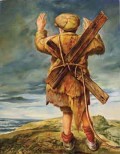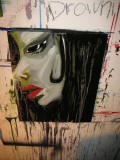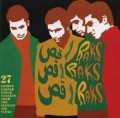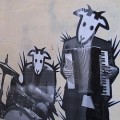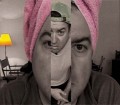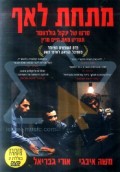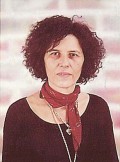Arts and Culture
Poem: On the Line
Like Chad Gadya, the enumerated song of the Pesach goat, or children’s counting songs, Greenberg’s poem counts down Jewish identity.
Ideal Viewer
Amir’s piece Ideal Viewer is currently is on view in PERFORMA09: The Third Biennial of New Visual Art Performance.
Tel Aviv Wake Up
Just a few days ago, two Arab girls were prevented from entering Dizengoff Center due to their ethnic origin and what they were wearing. It was without any justification… And no one is speaking up.
The Ghosts of Samuel Bak
There are very few visual artists who have been able to capture the feeling of loss so powerfully. Particularly given the continuing distortions to which our memories of the Holocaust remain subject. Enter the world of a true survivor.
Fiction: Bart's Voices
Each month, Zeek publishes a new work of U.S. fiction. This month, meet an artist and two lovers, fire and water, death by drowning. Whose voice speaks the truth?
Days of Future Past: Iranian Garage Rock of the 1960s
Like many locales that are retroactively said to have had garage rock scenes, Iran was not a country where many people actually had garages. It still isn’t. To imagine young Iranians hammering out tunes in a subdivision of three-bedroom homes with two-car garages is to indulge a fantasy that is simultaneously economic and political. We are drawn to the vision of an Iranian garage scene in the 1960s precisely because we perceive it as a future past. And we are drawn to Raks Raks Raks because it gives us hope that it is not a future past redemption.
A Night During the Gulf War
Yossel Birstein (1920-2003) was a significant talent, “on par with Kafka and Agnon,” according to critic Menachem Perry. Birstein’s wanderings, and his ideological convictions cut through with irony, make him an intriguing symbol of the vagaries of modern Jewish life.
Studying Violence: The Films of Avi Mograbi
According to the infamous Israeli director, a filmmaker cannot explore violence without becoming subjected to it, as its victim or, more probably, as its perpetrator. Zeek’s film editor, Shai Ginsburg, gets to the bottom of Avi Mograbi’s unique approach to documentary productions.
A Blessing from my Grandmother
The Holocaust remains a key trope for the construction of Jewish identity. In this memoir, a frum family comes to accept the rabbinic ordination of Rabbi Pamela by recalling the memory of her namesake, Grandmother Pessel, who fought for her own liberation from the Nazis.
Lessons from My Mother
Andrea Dezsö, Lessons From My Mother, 2006 cotton and metallic floss embroidery on cotton fabric 5X5 inches. Number of pieces in series: 50
Reinventing Ritual
Click here for a slideshow from the current Jewish Museum show, Reinventing Ritual: Contemporary Art and Design for Jewish Life. This show surveys the avant-garde design of objects and art that renew Jewish practices. The nearly sixty works in Reinventing Ritual envision a more sustainable and harmonious future, where identity is indelibly connected to action, not image.
Halakhic Striptease: Avi Nesher's The Secrets
During the 1980s, Israeli filmmakers were preoccupied with the Israeli-Palestinian conflict. In the 1990s, they explored the dynamic between Israel’s urban centers and the country’s periphery. The past decade has witnessed a rise in films that seek to portray the experience of communities previously considered marginal to Israeli cinema. Avi Nesher’s latest drama, The Secrets (Israel/France, 2007), joins a host of recent Israeli films, both feature-length and documentary, which explore Israel’s ultra-orthodox community.
A World Without Ashkenazim
Since its release in 1982, Jacob Goldwasser’s first feature, Under The Nose (Mitahat La’af) has acquired cult status in Israel, setting the cinematic standard for portraying domestic social problems for many years to come. To mark its 25th anniversary in 2007, Under The Nose was released on DVD. A script book was also recently published which included an interview with the director and the scriptwriter, three essays, and a short story inspired by the film — a rare event for a cultural scene in which the study of film is sparse.
Jewish Film Festival Diary
The San Francisco Jewish Film Festival requires little introduction. Now in its twenty-ninth year, the annual summertime event has turned into the most important global gathering of its kind. Transforming the west coast American city into a temporary stand-in for Berlin or Cannes, albeit a Jewish version, is no small feat. Nor is the festival’s distinction for helping serve as the North American starting point for some of Israel and Europe’s most significant new Jewish productions.
In Search of Anti-Semitism
Defamation is contentious, malicious even, to some, because it’s director refuses to accept at face value the belief that Jews are always victims of racism, and sets out to find out who makes such claims today, and why.
(De)Programming the Middle East: A Conversation with Jamal Dajani
If you haven’t seen it before, Mosaic will change the way you think about the Middle East. A thirty-minute daily news report aggregating content from the region’s major television news outlets, this seven-year old program airing on Link TV has skyrocketed in popularity among North American viewers. Why? Because, to paraphrase Jamal Dajani, Mosaic’s producer, his show is helping air a new regional identity which includes both Israeli and Arab voices from throughout the Middle East.
Enemies Out of the Frame: Joseph Cedar’s Beaufort
Ostensibly, Joseph Cedar’s film Beaufort (Israel, 2007) portrays the denouement of the first Lebanon war, which came to an end with Israel’s withdrawal from southern Lebanon in 2000. Undoubtedly, however, it seeks to comment on Israeli society in the aftermath of the second Lebanon war. Following Time of Favor(2000) and Campfire(2004) Beaufort is Cedar’s third film. Currently showing in Israel to both critical acclaim and commercial success, Beaufort has already garnered the prize for best director in this year’s Berlin Film Festival.
The Tragedy of the Smile
Tamar Yarom’s 2007 documentary To See If I’m Smiling is a fascinating, yet disturbing study of the effect of the Israeli-Palestinian conflict on the Israeli psyche. The film is comprised of interviews with six female military veterans, who did much of their active duty in the Occupied Territories, in Judea and Samaria and in the Gaza Strip prior to Israel’s unilateral withdrawal from the territory.
Mirror to the Crisis: Israeli Media
Whenever I return to Israel, I always make a point of listening to local talk shows and reading as many magazines as possible. If you want to gauge changes in public opinion quickly, there’s no better way to do it. My last trip back to Israel, in June, is no exception. The following are my incidental observations.
Jewish Film Festival Diary, Week 2
The recent stream of successful Israeli features—The Band’s Visit, Waltz with Bashir, and Beaufort, to name the most obvious—has significantly raised the bar for Israeli filmmakers. No longer can we consider oursleves satisfied by a well-made, albeit Israeli film. Rather, inclined moviegoers are lead to expect extraordinary cinematic experiences, of the kind that an increasing number of Israeli films simply cannot provide.
![[the current issue of ZEEK]](../../../image/2/100/0/5/uploads/leftistethicistgraphic-52842c6a.png)
- 5000 Pages of Zeek
- Founded in 2001, Zeek was the first Jewish online magazine, and we have over 5000 pages online to prove it, all available free of charge. Read more in the Archive.



